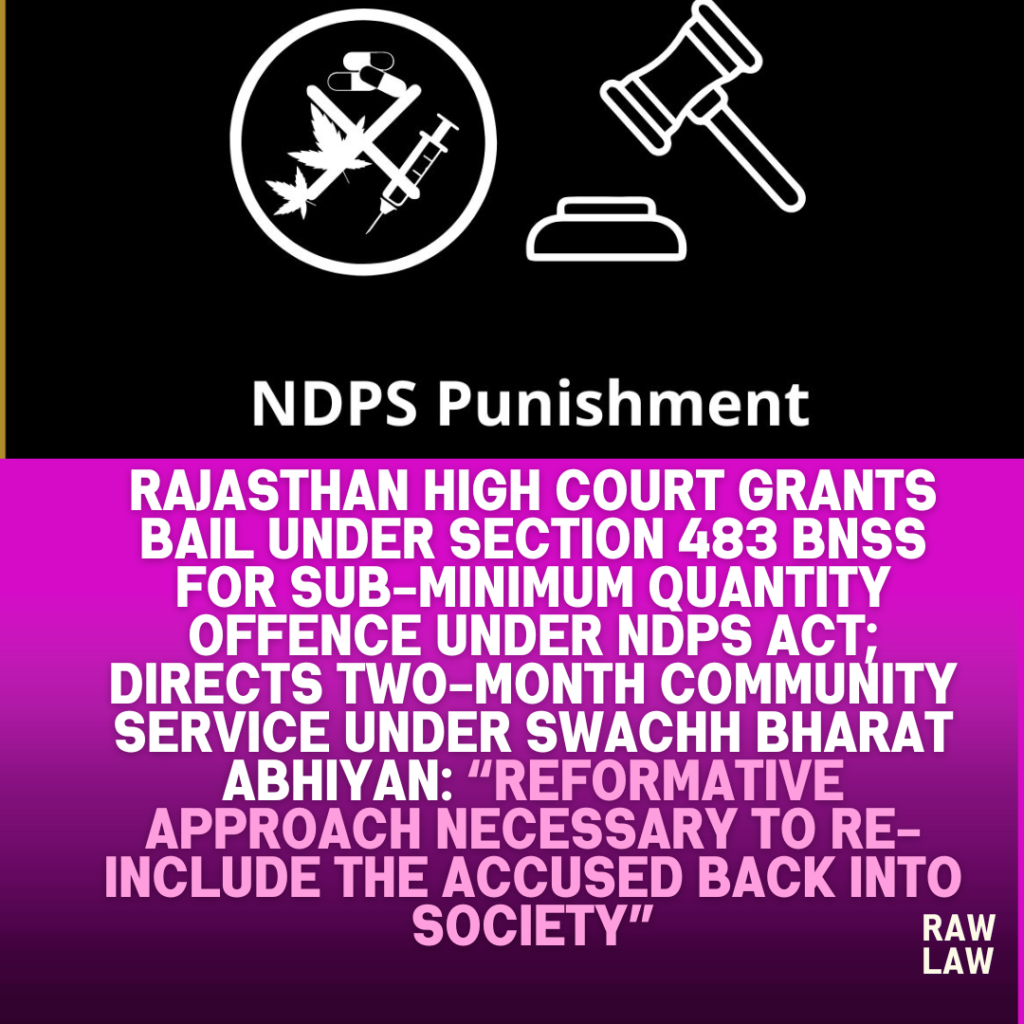Judgment Name: Shivsingh Meena v. State of Rajasthan
Date of Judgment: 13 June 2025
Coram: Justice Sameer Jain
Bench: High Court of Judicature for Rajasthan at Jaipur
Court’s Decision
The Rajasthan High Court allowed the bail application filed under Section 483 of the Bharatiya Nagarik Suraksha Sanhita (BNSS), 2023, by an accused arrested under Sections 8 and 21 of the NDPS Act. Taking into account that the recovered contraband was 605 grams — below the prescribed commercial quantity — and considering the accused’s age and socio-economic condition, the Court granted bail on execution of a personal bond and sureties. Importantly, the Court also imposed an ancillary condition: the applicant shall perform two hours of daily honorary service for two months under the Swachh Bharat Abhiyan, marking a reformative turn under the new legal regime.
Facts
An FIR was registered at Police Station Kho Nagoriyan, Jaipur (East), under Sections 8 and 21 of the NDPS Act, following the recovery of 605 grams of a contraband substance from the applicant. The accused, aged around 40 and the sole breadwinner of his family, had been in judicial custody, and the charge-sheet had already been filed by the time the bail application was moved. The applicant sought regular bail under the newly enacted Section 483 of the BNSS, 2023.
Issues
- Whether bail should be granted under Section 483 of the BNSS in a case involving a sub-commercial quantity of contraband under the NDPS Act.
- Whether the Court may impose ancillary, reformative conditions while enlarging the accused on bail.
Petitioner’s Arguments
Counsel for the petitioner argued that the accused was aged around 40 years and was the only earning member of his family. It was emphasized that the quantity seized (605 grams) was below the commercial threshold under the NDPS Act, and that the charge-sheet had already been filed. The petition urged the Court to adopt a humane and reformative approach, especially since continued detention would result in undue hardship to the family.
Respondent’s Arguments
The Public Prosecutor opposed the bail application and highlighted that criminal antecedents had been registered against the accused. However, no serious objection was raised concerning the quantum of contraband or the stage of investigation.
Analysis of the Law
Section 483 of the BNSS empowers courts to grant bail, and under the framework of the NDPS Act, non-commercial quantity offences are not subject to the same rigour as commercial quantity cases. The Court examined the nature of the offence, quantum of substance seized, and the personal circumstances of the applicant. Additionally, the judgment draws from the objectives of the BNSS, which lays renewed emphasis on rehabilitation and social reintegration through community service under certain conditions.
Precedent Analysis
While no specific judgments were cited in the order, the ruling reflects the evolving jurisprudence under the BNSS and principles laid down in previous decisions emphasizing the bail as a rule and jail as an exception in non-serious NDPS cases. The incorporation of community service aligns with international and domestic precedents promoting restorative justice and proportional sentencing for first-time or low-level offenders.
Court’s Reasoning
Justice Sameer Jain weighed the balance between societal interest and individual liberty. Recognizing the sub-commercial quantity involved and the applicant’s socio-economic background, the Court observed:
“Looking to the overall facts and circumstances of the case and material on record but without commenting on merits/demerits of the case, this court is inclined to allow the bail application…”
Notably, the Court introduced a reformative measure by directing the accused to undertake daily honorary work for two months under the Swachh Bharat Abhiyan, stating:
“…as an extended interpretation of the provisions of ‘community service’ as enshrined under the Bhartiya Nayay Sanhita… the applicant shall contribute to the Swachh Bharat Abhiyan… under the supervision of the SHO and local authorities.”
Conclusion
The bail application was allowed. The accused was directed to furnish a personal bond of ₹50,000 with two sureties of ₹25,000 each. The court further mandated that the applicant shall engage in two hours of daily community service for two months as part of a reformative condition under the Swachh Bharat initiative, supervised by police and municipal authorities.
Implications
This is a landmark interpretation of Section 483 BNSS, merging traditional bail considerations with restorative justice principles. It sets a significant precedent for incorporating community service as a tool of conditional liberty. This approach not only upholds public hygiene missions like Swachh Bharat Abhiyan but also provides a constructive path for reintegration of low-level offenders.
Cases Referred
No specific judgments were cited in this order. However, the ruling builds on broader judicial philosophy favouring bail in cases involving non-commercial quantities under the NDPS Act and signals a progressive implementation of the BNSS, 2023 and BNS, 2023.



